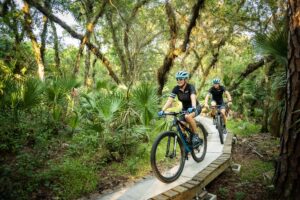

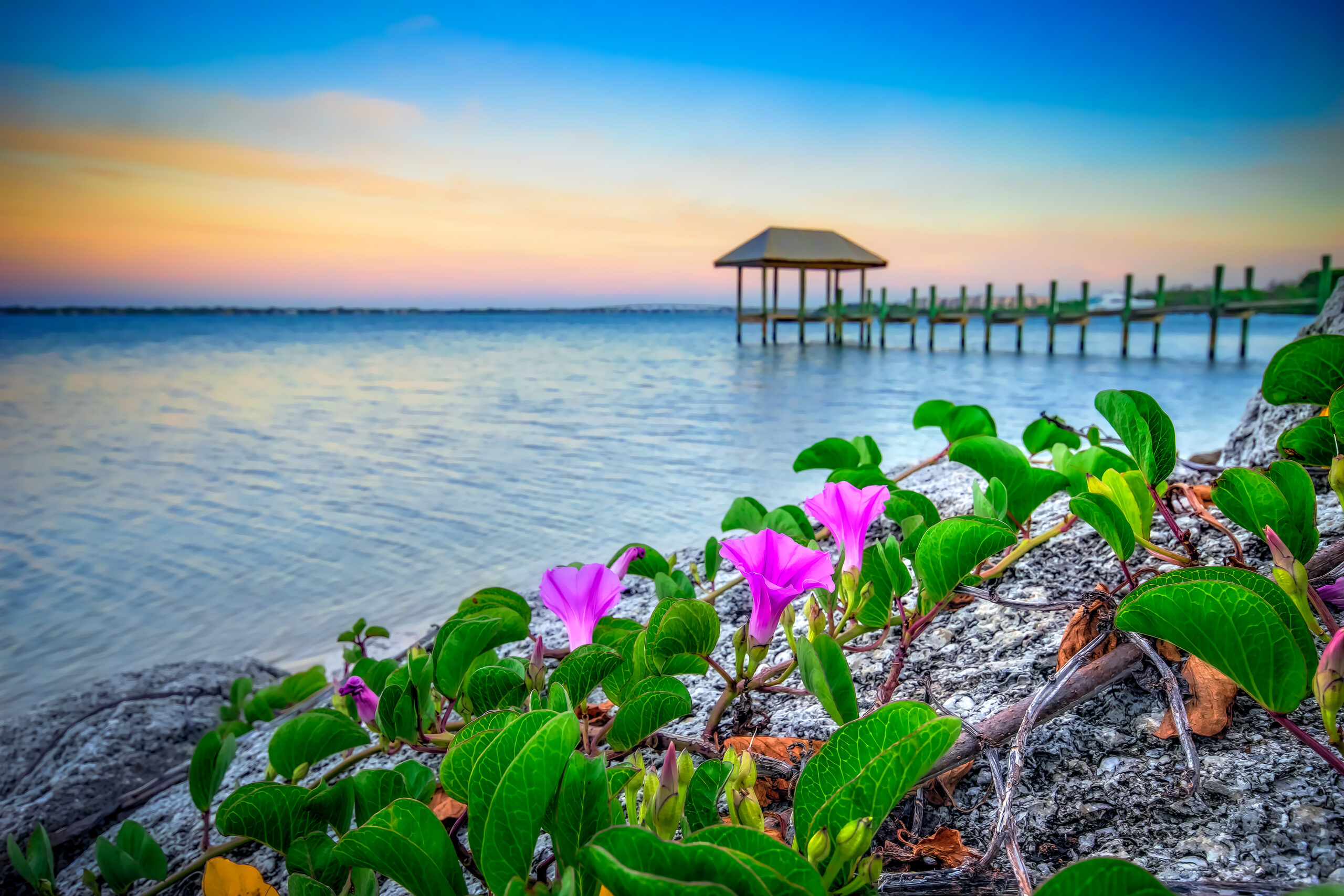
Leave No Trace is an internationally recognized non-profit organization that aims to protect natural lands by educating people how to explore responsibly. Whether you’re a long-time resident or just visiting for the weekend, we all can play a part in helping to conserve our lands.
Looking for a fun way to celebrate Earth Month and to make a difference? Leave No Trace is hosting the #LeaveNotTrash Challenge as part of the annual #LeaveNoTrash Campaign. This campaign is a global movement inspiring everyone around the world to get out and clean up trash in the outdoor areas they love.
Sign up today and you can win fun give-a-ways and help the natural areas you love!
-Research the area that you plan to visit so that you can adequately prepare and have both a safe and enjoyable adventure. This includes knowing the areas conditions, terrain, wildlife, and any rules/regulations.
-Check weather conditions and prepare for them as needed. Florida’s weather can change from sunshine to rain in just a few hours, so remember to pack both your sunscreen and your rain jacket!
-Travel safely by having a copy of your map, packing a first aid kit, and telling others about your travel plans. And of course, do not forget your water!
-Whether you’re renting a kayak or a pontoon, make sure you know how to navigate the water safely and correctly. This includes how to interact with other boaters, following waterway markers, and knowing where you can and can’t go.
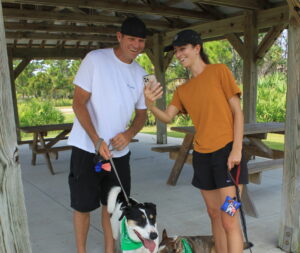
-Stick to designated trails to avoid damaging vegetation and widening the trail, as well as to protect yourself from potentially hazardous conditions. And this is the same for your leashed pet too!
-Camp on designated campsites to limit your impacts on the surrounding environment.
-Avoid walking on the dunes as they are a very fragile and important ecosystem. Use boardwalks or marked paths to get to and from the beach.
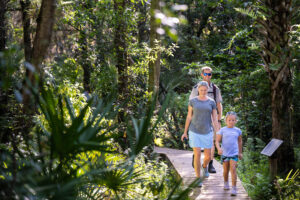
-Ensure everything you bring into a natural area gets brought back out. This could include snack wrappers, food waste, beach toys or chairs, or any other personal items. Be prepared to take your trash with you, as some locations don’t have cans available.
-Pick up your pet’s waste and properly dispose of it in a trash can. Pet waste can negatively impact other visitors’ experiences, as well as pollute water sources and carry diseases.
-Bring reusables to limit your amount of trash produced in an area.
-Research the areas restroom availability before you visit. If none are available, know how to follow guidelines for disposing of waste in nature. If visiting a spoil island, don’t forget your WAG bag! If you forget, there are dispensers on the recreation islands that are often filled with them free of charge.
-There are 5.25 trillion pieces of plastic debris in the ocean. Do your part by picking up trash that you see along the beach to limit what goes into the ocean and to help animals that often accidentally ingest it.
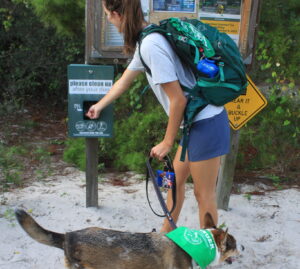
-Take pictures instead of objects. Please don’t take items that make our ecosystems so special such as seashells, plants, rocks, or any other natural items that you find. Take a photo instead! Not only are these items very important to the area’s ecosystem, but it allows others to enjoy them too.
-Leave the beach safe for wildlife by filling in sand holes, knocking down sandcastles, and taking all personal items. You can save a sea turtle’s life by doing these things.
-Take sea glass instead of seashells. Have a blast finding and collecting sea glass as it is not natural to the environment and is not harmful to take!
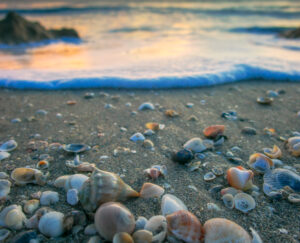
-Florida is no stranger to droughts or wildfires. Please do your research and confirm if fires are allowed. Many times, fires are not allowed due to dry conditions or site limitations. If you are able to make a fire please make you create one responsibly by using existing fire rings when available and fully extinguish a fire before leaving. Learn more here.
-Follow all beach fire rules. In Martin County, beach fires are allowed with a permit on Stuart and Jensen Beach from 5pm-11pm only during November-February. You can find more information about beach fires and how to get a permit here.
-Do you need to have a fire? Explore other fun and strategic options here to create that camping ambiance and maybe even find a new fun tradition!
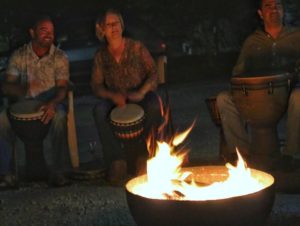
-Observe all wildlife from a distance as to not scare them and to keep yourself safe. If you want a closer look, consider bringing binoculars or a camera with zoom.
-Always keep your pets on a leash so they do not run at and disturb wildlife.
–Wild animals are wild! No matter how temping or how cute and fuzzy, for their health and safety, as well as yours, please never feed wildlife.
-To protect our endangered sea turtles, make sure you keep beaches dark, flat, and clean. This means not going on the beach with flashlights, filling in beach holes and removing sandcastles, and removing all trash and personal items.
-Our beaches are home to many ground-nesting birds. Help protect them by respecting posted areas that say the birds are present and keep your dog leashed so they don’t disturb them. One dog can destroy an entire nesting colony of birds in seconds.
-To protect marine mammals such as manatees and dolphins, make sure you stay at least 50 yards away if you spot one, drive slowly and carefully, and follow posted speed zone signs.
-Report any injured or dead animals to the Florida Fish and Wildlife Conservation.
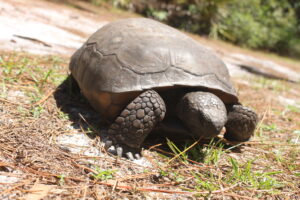
-Be respectful of others who are enjoying the outdoors to create a positive experience for everyone.
-Be mindful of you or your groups noise levels and remember that sound travels better over the water.
-Following yielding rules on multi-use trails. As a hiker, you have the right of way over bikers, but must yield to horses. As a biker, you must yield to both horses and hikers. If on horseback, you have the right of way over hikers and bikers.
